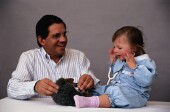- Could Your Grocery Store Meat Be Causing Recurring UTIs?
- Are You Making This Expensive Thermostat Error This Winter?
- Recognizing the Signs of Hypothyroidism
- 10 Strategies to Overcome Insomnia
- Could Artificial Sweeteners Be Aging the Brain Faster?
- Techniques for Soothing Your Nervous System
- Does the Water in Your House Smell Funny? Here’s Why
- Can a Daily Dose of Apple Cider Vinegar Actually Aid Weight Loss?
- 6 Health Beverages That Can Actually Spike Your Blood Sugar
- Treatment Options for Social Anxiety Disorder
Doctors Often Ignore Parents’ Concerns About Autism in Young Kids: Study


Delays in diagnosing and treating autism often occur when doctors ignore parents’ concerns about their child’s early development, a new study suggests.
A team led by Dr. Katharine Zuckerman, of Oregon Health and Science University in Portland, compared the medical records of more than 1,400 children with autism against those of 2,100 children with other forms of delayed intellectual development.
For children who later turned out to have an autism spectrum disorder, doctors and other health care providers were 14 percent less likely to have taken action — such as conducting developmental tests or referring the child to a specialist — in response to parents’ concerns about autism, compared to children from the other group.
The researchers also found that health care providers were more likely to tell parents of children with autism that the child will “grow out of it,” the researchers reported April 15 in The Journal of Pediatrics.
“We know that early identification of autism spectrum disorder is beneficial to children and their families,” Zuckerman said in a journal news release. “Unfortunately, many families experience long delays between when they first have concerns and when their child gets diagnosed with autism spectrum disorder.”
As the researchers explained, children with autism can develop symptoms even before they’re 2, and early diagnosis is associated with better long-term outcomes.
One in 68 U.S. children has an autism spectrum disorder, according to U.S. Centers for Disease Control and Prevention estimates.
In the study, parents often had concerns about autism when their children were about 2, and discussed these concerns with a health care provider when their children were an average of 2.3 years old.
However, children with autism in the study were typically not diagnosed with the disorder until about age 5 — nearly 3 years after parents first expressed their concerns to health care providers, the study found.
“The behavior of health care providers is likely a very important factor in delayed autism identification,” Zuckerman said.
Two experts said the findings are disheartening.
“For many years, autism advocacy groups and the U.S. Centers for Disease Control and Prevention have urged parents to learn the signs of autism and act early by talking to their doctor if they are concerned about their child’s development,” said Alison Singer, president of the Autism Science Foundation.
“It’s heartbreaking to think that these families’ concerns are being ignored or rebuffed by doctors when we know that early intervention — the earlier, the better — can make a huge difference in a child’s life,” she said.
Dr. Andrew Adesman is chief of developmental and behavioral pediatrics at Cohen Children’ Medical Center of New York, in New Hyde Park, N.Y.
He stressed that an autism diagnosis is not a “black-and-white” affair, and pediatricians must “walk a fine line between making an accurate developmental diagnosis as early as possible on the one hand and not rushing to judgment on the other.”
Still, he said, “it is unfortunate that almost three years pass from when a parent first expresses concerns to his or her pediatrician and when the child gets a diagnosis of an autism spectrum disorder.”
New guidelines that urge pediatricians to repeatedly screen toddlers for autism should boost rates of early detection, Adesman said.
In the meantime, Singer believes that “health providers need more education and training so that they can respond promptly and appropriately to parental concerns.”
More information
The U.S. National Institute of Neurological Disorders and Stroke has more about autism.
Source: HealthDay
Copyright © 2026 HealthDay. All rights reserved.










